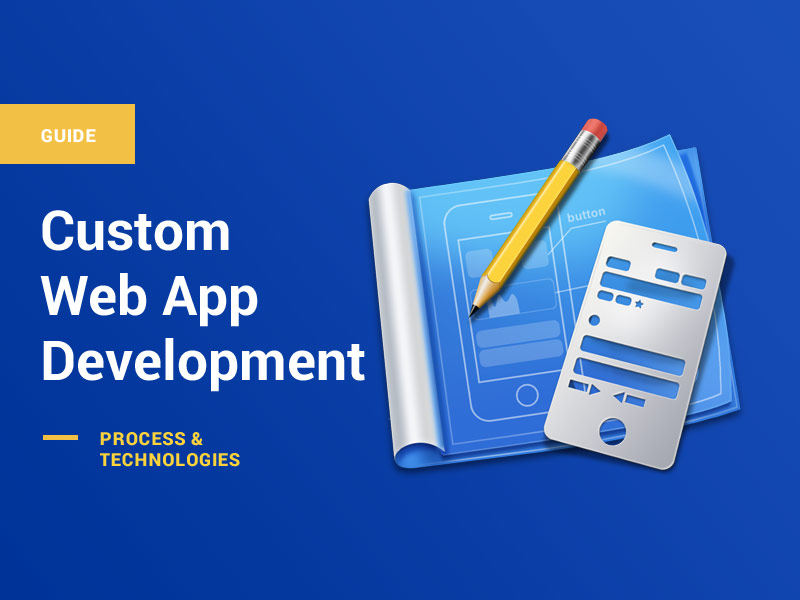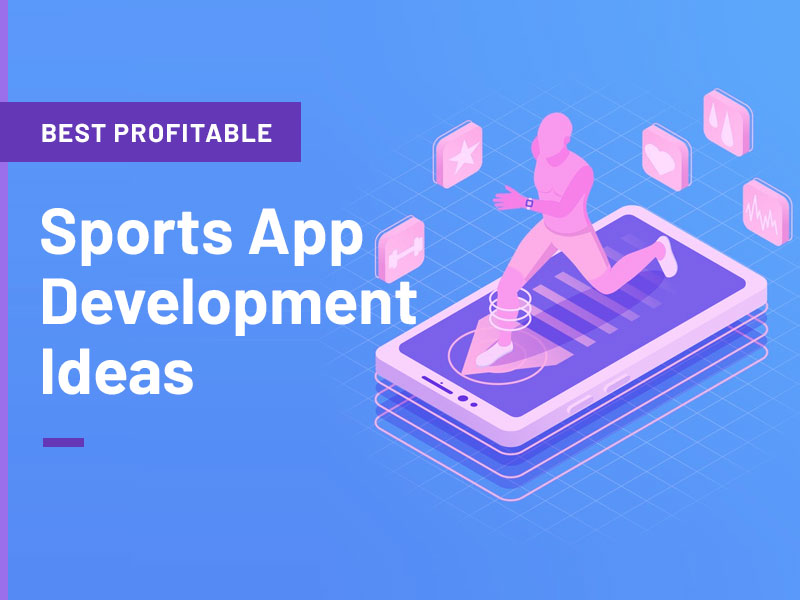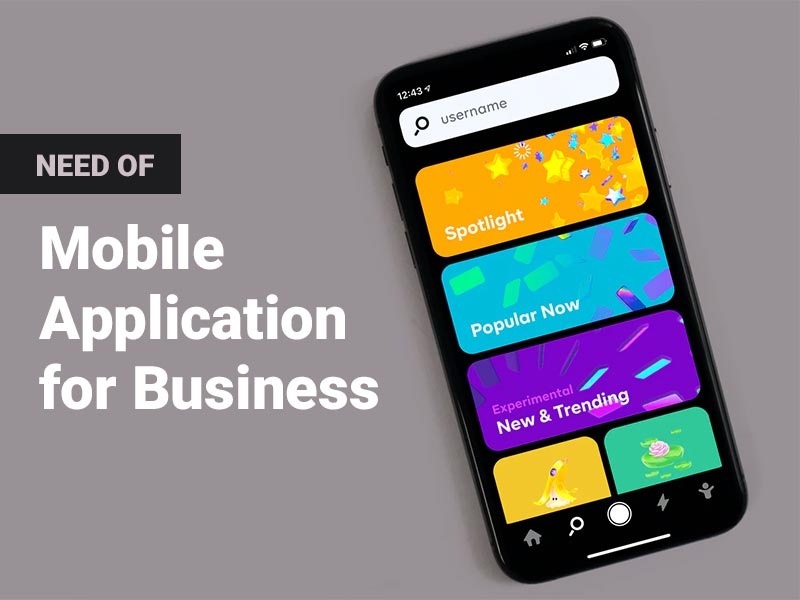Desktop applications witnessed a gradual shift to mobile applications. Mobile apps gained popularity as it has wider outreach. Mobile applications are expanding widely. The emergence of 5G technology and the COVID-19 pandemic have reshaped the use of technology. Mobile communication has witnessed unprecedented growth. The portability of mobile devices has resulted in a higher consumption ratio.
Statista reports a 4.28bn Mobile internet population worldwide. The industry has reached saturation levels in North America and Europe. However, in 2020, 60% of the mobile internet traffic was from Africa and Asia.
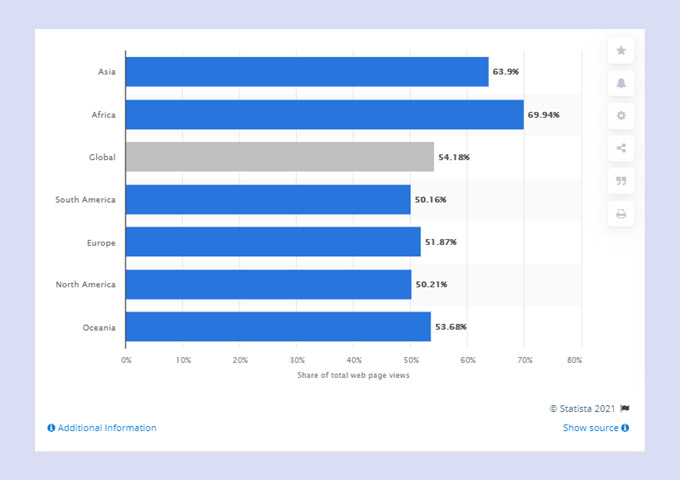
The affordability of mobile apps and their portability have resulted in the wide room for growth in developing nations.
The number of mobile app downloads has witnessed steady growth. In 2016, the total number of downloads accounted for 140.68bn whereas, in 2020, it accounted for 218bn.
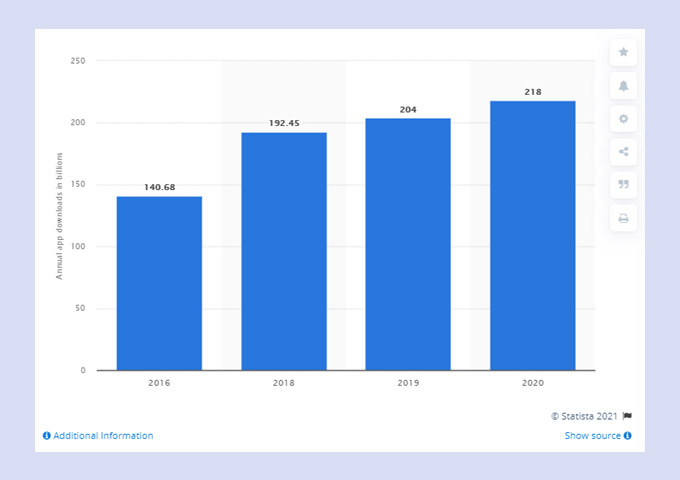
Source: Statista
This steady growth confirms no indication for saturation in the near future. Instead, it reflects the upcoming wide opportunities.
Mobile apps are consumed by heterogeneous audiences. Be it a small business or a large enterprise, mobile apps have added value to businesses. Developers are gearing up for advanced and innovative mobile apps.
A lot of factors play a decisive role in the success of mobile applications. To mention a few, frameworks, ASO, platforms, and others. Advanced mobile app frameworks have made the development cycle easier for developers.
When it comes to choosing a framework for mobile apps, it’s between native apps and hybrids. Before we go deeper into hybrid apps, let’s get the basics clear.
What is the difference between native and hybrid apps?
Native apps are developed for dedicated platforms such as iOS or Android. For android app development, Java or kotlin are widely used. Similarly, for iOS apps, Swift or Objective-C is used. Native apps have high and speedy performance. However, the development time is expensive. The main drawback is that apps written in one code cannot run on other platforms.
On the other hand, hybrid frameworks are an amalgamation of developing native and web apps. Thus, the name goes hybrid. It is developed for multiple platforms. Hence it suits the best for cross-platform apps. The technologies used are HTML, JavaScript, as well as CSS. These support faster and easier development. Hybrid app development is cost-saving. Because a single code base works with multiple platforms.
Why choose Hybrid App Development?
Hybrid mobile app frameworks are favorable in the market due to their amazing features and functionalities. They are known for their capability of producing native-like apps.
60% of businesses prefer hybrid apps over native. Studies reveal that 80% of businesses do not bother about the framework. All they need is desired output. Hence, the developers are free to use any framework. All that matters is meeting client requirements.
There are various hybrid app development frameworks. The task is to choose the apt mobile app development framework. Let us take a look at the key determinants to choose a framework.
Determinants of Framework
● The Intention
It is important to consider your intentions and then shortlist a framework that suits the project requirements aptly.
● Flexibility
Flexibility is important for any given app. Flexibility provides freedom of using a product. Whenever any new requirement crops up, the framework must be capable enough to modify the app accordingly.
● Learnability
Before selecting the framework, check the learning curve. Complex frameworks need experts. Simpler ones can be grasped easily by your existing team. Above all, the framework should help you gain better results and support your future endeavors.
● Documentation
A framework that has proper documentation cuts down the time invested. In cases where you are stuck and wonder what to or how to do, documentation is for your rescue. Documentation addresses your queries similar to a user guide.
● Support
Check the user support system. Whenever you are in any confusion or whenever you want to update, the support team is vital. It helps the users with the right information and get flawless solutions.
Now that we have understood the determinants, let us take a look at different hybrid app development frameworks.
Top 10 Frameworks for Hybrid Mobile App Development
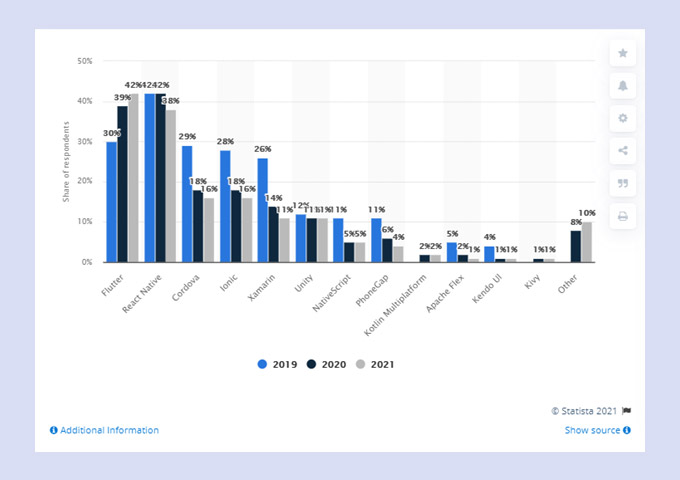
1. Ionic
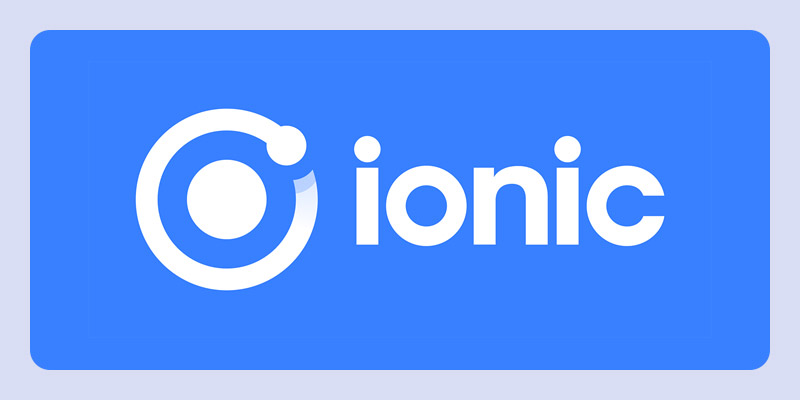
The oldest hybrid app development framework Ionic was launched in 2013. Yet, in 2021, Ionic stands popular among the frameworks. 5 million-plus apps are built using the Ionic framework. It has won the trust of not only developers but also leading companies.
Ionic provides a native-like user experience. It has outstanding in-built elements. Front End uses AngularJS and Cordova. It has a rich library that helps developers to create top-notch apps with the best graphical representations. Hence developers choose Ionic.
Pros:
- It has a set of predefined UI elements. Thus, one can bring out impressive designs.
- Ionic has comprehensive documentation. This helps to gain a proper understanding and ensure proper usage.
- It is backed by strong community support.
- Single code can be used to build apps for various platforms.
- Easy to develop progressive web apps (PWAs).
Cons:
- Does not support hot-reloading.
- It has a high dependency on plugins.
- Speed decreases with more features.
- Sometimes, testing gets intrinsic.
2. React Native

React native, a Facebook product is the next best hybrid app framework. The first release was in 2013 and the final stable release was in June 2019. Initially, it was a web interface development platform. In 2015, it supported hybrid app development.
Building cross-platform apps with React Native is as easy as cutting a cake for developers. React Native app development provides a native-like user experience. It is highly stable. Ionic and React Native is often used as the most common alternatives for hybrid app development.
React Native is widely used to develop iOS and Android apps. It allows the developers to build cross-platform apps with a single JS codebase. Developers who hold expertise with Java and Swift choose React Native app development. Leading brands such as Facebook, Instagram, Skype, Gyroscope use React Native.
Pros:
- Native modules support high-performance apps.
- Allows third-party plugins.
- Supports Node.Js
- Less expensive when compared to other frameworks for hybrid app development.
- Easy bug identification and fixing.
- Allows live reloading with two screens- code modification and preview.
- Less development time and speedy time to market.
Cons:
- Few compatibility issues are encountered.
- Amateur developer community.
- Needs better access to hardware and navigation components.
- Does not suit apps with multiple screens and UI transitions.
3. Flutter

One of the latest hybrid app development frameworks is Flutter, a product by Google. Flutter, a premier open-source SDK, is not only powerful and advanced but also bankable. It supports the creation of apps for multiple platforms with a single codebase.
Flutter uses DART as a programming language along with Kotlin and Java. Flutter has a C++ rendering engine. Further, it uses the 2D rendering engine Skia. It has a complete UI development kit. It supports component implementation in the absence of OEM widgets or web views. Leading companies that employ Flutter are Alibaba, Hamilton Musical, etc.
Pros:
- Extra-ordinary cross-platform capabilities.
- Supports lightning-fast development.
- Enables creation of MVPs.
- Backed with Google support.
- Rich, interactive UI design and seamless development.
- Coders can view the changes in the application immediately.
- Compatible with Fuchsia, Google’s Mobile OS.
Cons:
- The community of developers includes only Google and Alibaba employees.
- When compared to Native counterparts, the flutter apps are heavier.
- New to the market and hence needs time to mature.
- For iOS, it lacks profile data completion.
- Developers must know the Dart language.
4. Xamarin
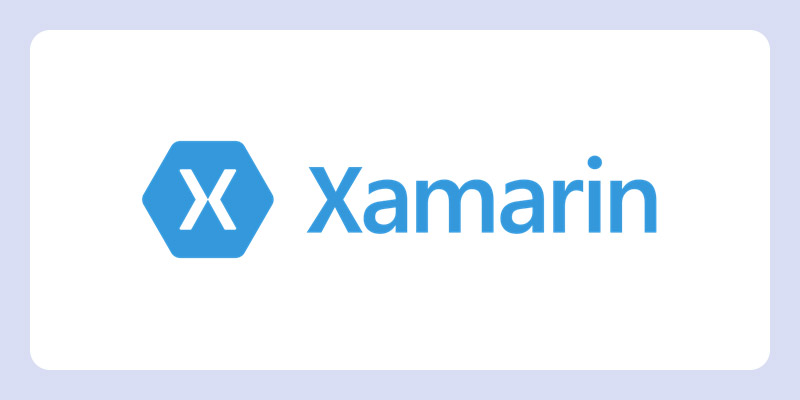
Xamarin is owned by Microsoft. The framework suits the best for developing aesthetically sound hybrid apps. It runs seamlessly on various operating systems such as iOS, Android, Windows, percent, and others. Xamarin, with modern C# language, makes the development smoother. Developers are allowed to use .NET and native APIs to develop hybrid apps.
This intelligent framework significantly reduces the explicit costs associated with development. Xamarin competes with React Native. Developers lookout to balance creativity and budget. Hence Xamarin favors creative ways with a minimum budget.
Pros:
- It supports code reusability up to 95%.
- Xamarin has a wholesome development environment including Xamarin Studio, Xamarin SDKs, Test Cloud, and Insights.
- It integrates seamlessly with external hardware.
- It has native-like, superior UX performance.
- High stability and consistency.
- Backed with excellent code sharing.
Cons:
- Slightly expensive when compared to other hybrid app development frameworks.
- A very limited set of experienced developers.
- Limited access to technologies.
- Do not suit game development.
5. PhoneGap
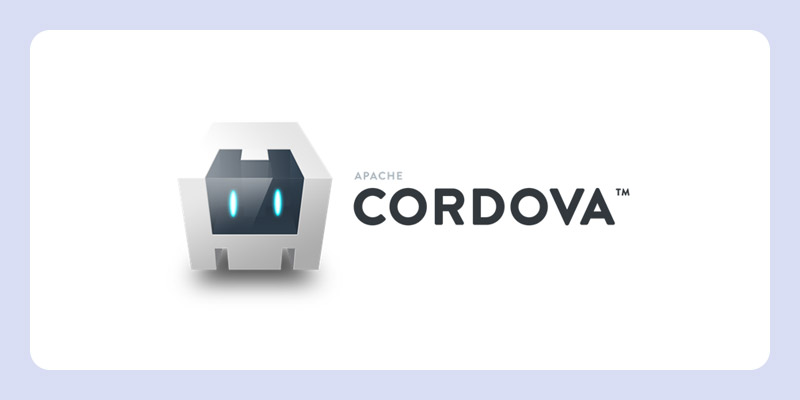
PhoneGap or Apache Cordova is a framework supported by Adobe and Cordova framework. It can be written by JavaScript, CSS3, or HTML5 developers. This reliable cross-platform framework is compatible with one code across multiple platforms. It is cost-effective and suits the best when developers have budget constraints.
PhoneGap is simple to learn. Apache Cordova is an extremely flexible framework that is compatible with iOS, Android, as well as Windows 7.
Pros:
- Wider access to Native APIs.
- Backed with strong backend support.
- Feature-rich UI libraries.
- The cloud compiler “Build” has the capability to compile apps without SDKs.
- Wider outreach and efficiency.
- Seamlessly taps into system hardware without affecting the UI.
- Supports Rapid Testing.
Cons:
- Apps are sometimes slower.
- Suits well only for small businesses.
- Less pre-built widgets for UI.
6. NativeScript
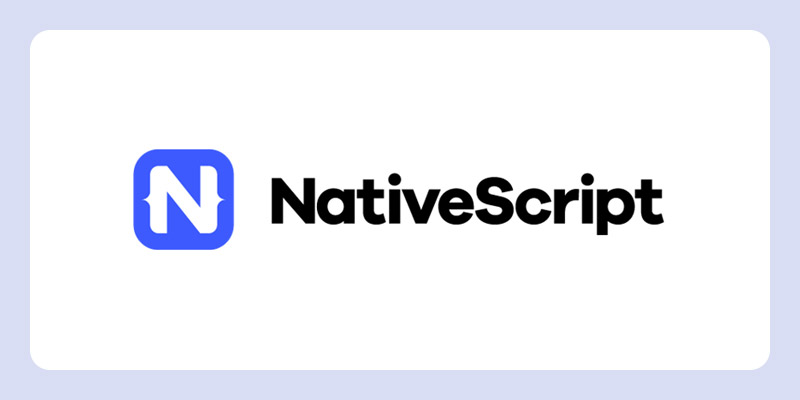
NativeScript is a cross-platform app development framework that can be coded with JavaScript, TypeScript, NativeScript, or Angular. It supports API access for both iOS and Android.
These apps can be integrated with libraries from npm.js, CocoaPods, and Maven. It does not require a wrapper. It employs reflection to deal with native API endpoints. NativeScript employs reflection to gain information and metadata concerning native platform APIs. If you use Angular, it allows you to share large chunks of codes.
Pros:
- Fast execution.
- Runs as a platform-specific app.
- Supports Vue.js.
- Open-source framework.
- Telerik backup.
Cons:
- Poor documentation
- Unrealistic assumptions
- Misleading description of the ecosystem.
7. Framework 7
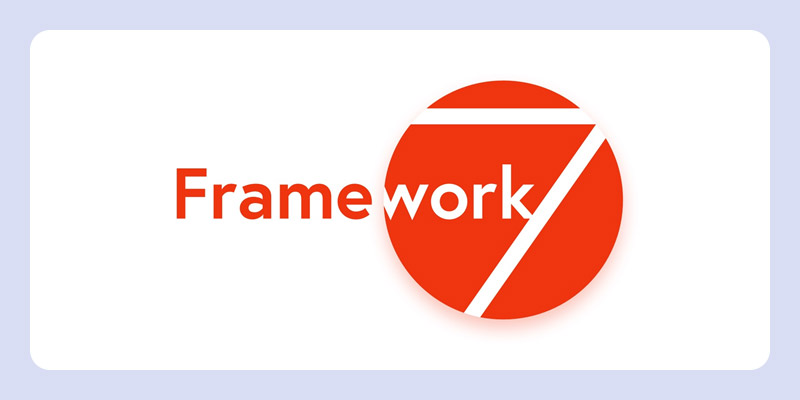
Framework 7 is an HTML5 based framework. This framework has dependencies neither on AngularJS nor React JS. It supports Android and iOS. The developer has the freedom to choose among the variants. To name a few, Framework 7 Core, React, or Vue. It also allows the developer to choose the target platform, be it PWA, or web app, or Cordova app.
Pros:
- The apps are highly scalable and fast.
- Backed by satisfactory community support.
- License-free app development.
- The native appearance of the app.
- Seamless performance of UI components.
- Wide range of widgets and components.
- Built-in library for help.
Cons:
- Poor documentation.
- Does not support integration with other frameworks of hybrid app development.
- Compatible with the latest versions of OS.
- Poor online support.
8. Corona
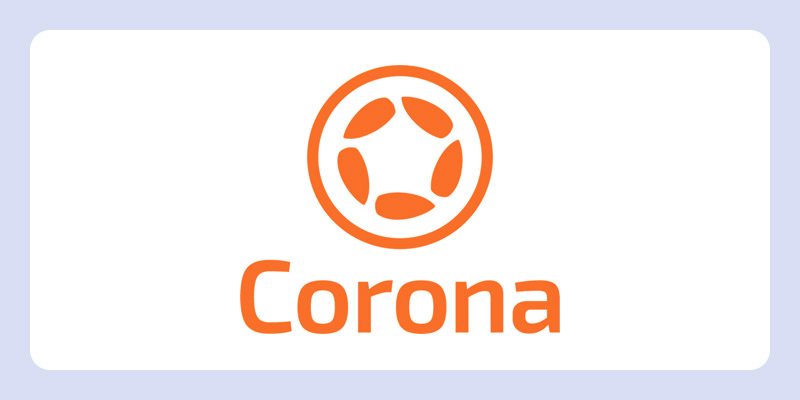
Corona, also called Solar2D, is an open-source framework. It is the best cross-platform mobile app development framework to build educational apps, gaming apps, and enterprises. It is known as a 2D game engine. The scripting language is Lua. It supports real-time testing. The framework is suitable to build web and mobile apps. It supports iOS, Android, Windows, along with applications such as Apple TV, Android TV, and Fire TV.
Pros:
- It is 4x faster.
- Lightweight yet powerful scripting language.
- Wide range of plugins.
- Strong API integration with Native library.
- High-performance
Cons:
- Limited access to the external library
- Lua is difficult for new developers
9. JQuery Mobile

JQuery hybrid framework is the best to create platform-independent mobile apps. Developers can create responsive websites compatible with different devices using JavaScript libraries as well as HTML. jQuery and jQueryUI are used to create mobile web applications. However, it is less preferred for mobile app development. It works best when it is used with other frameworks.
Pros:
- Easy navigation
- Touch optimization
- Matured framework
- Vast plugin library
Cons:
- Apps are comparatively sluggish
- The framework needs an experienced designer
- The complex app development process
- CSS issues with custom themes
10. Mobile Angular UI

This framework uses a combination of Angular JS and Bootstrap for cross-platform app development. Developers are allowed to use features such as switches, sidebars, overlays, and others. It is highly consistent across platforms and devices. Mobile Angular UI is licensed under MIT. It is an open-source framework available for free.
Pros:
- Uses HTML5
- Suits best for light apps
Cons:
- Restricted features
- Does not go well for complex apps
- High-dependency on Bootstrap
Let’s Wrap Up
The world of Apps is growing. Newer technologies and advanced frameworks boost app development. If you find it hard to pick a framework, you can settle for two and male as the best combination.
If you need further clarification, you can consult leading hybrid app development companies. They help you to get the best app with their expertise. Share your objectives and requirements with the consultancy and unlock suitable app development processes for your business.



